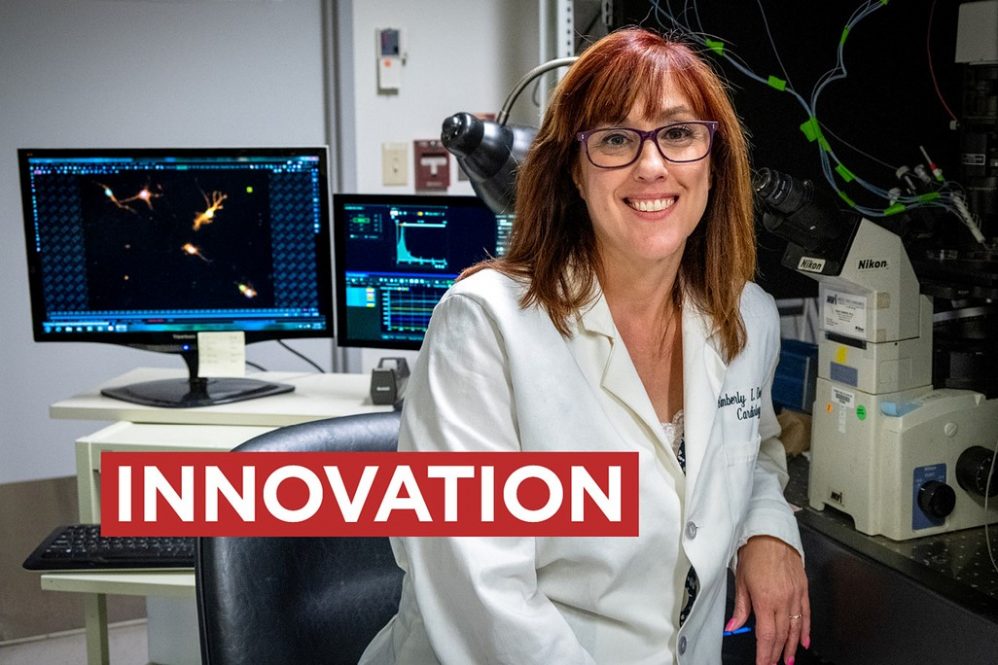When UConn Health research leaders think of innovation, two-decade NIH-funded cardiovascular basic scientist Kimberly Dodge-Kafka, Ph.D., immediately comes to mind.
“I study cell signaling mechanisms that induce cardiac diseases with an aim to someday stop them in their tracks,” says Dodge-Kafka.
Dodge-Kafka says everyone experiences a fight or flight feeling at times. This bodily response is actually your heart’s beta-adrenergic receptors hard at work. Via a pathway these proteins work to increase calcium signaling inside cells which can increase your heart rate, heart muscle’s contractibility, and your elevated response to the stressors around you, good during exercise, but potentially dangerous in the context of heart disease.
In May Dodge-Kafka received large NIH grant award funding to grow her novel research program challenging the status quo of current scientific knowledge when it comes to cardiac cell signaling and medication intervention.
“We hypothesize medications such as commonly used beta-blockers for heart disease patients may be primarily targeting the wrong subset of adrenaline receptors,” says Dodge-Kafka. “These medications only target the plasma membranes on cells to slow down the heart’s contractibility. While they can show some improvement for heart disease, they are not completely effective and can be improved upon. The receptors we should be treating for disease are intracellular, associated with the cell’s nucleus, where the genes responsible for induction of disease are located.”
Dodge-Kafka’s research pursuit is going against the current dogma about beta-blockers and innovatively rethinking the heart medication’s use as an intervention tool. She is finding a new target to cellularly aim to prevent heart disease progression.
In her cell-based research lab Dodge-Kafka and her team are using a combination of high-tech research approaches from live cell imaging to isolate and observe cardiomyocyte behavior to using spectrometry sensors for monitoring calcium surrounding the nucleus of heart cells.
“We are taking our laboratory findings to try to identify a new drug to stop heart disease that targets beta receptors inside cells,” says Dodge-Kafka. “We have already developed and tested a few promising drugs in mice models that might work!”
And there is one big goal in Dodge-Kafka’s mind.
“My big hope is to develop a new type of beta-blocker drug for humans that can block or reverse heart disease progression so patients can live a better, fuller, and longer life,” says Dodge-Kafka.
For example, one of Dodge-Kafka’s research models mimics the effects of high blood pressure. Persistent stress on the heart from high blood pressure, may take a while, but eventually a person will develop hypertrophic remodeling, a thickened and enlarged heart, as a result. According to Dodge-Kafka, if you don’t pay attention to high blood pressure and leave it untreated you will develop congestive heart failure (CHF) with heart muscle cells dying.
“But our research shows in the hypertrophic phase we can block heart disease progression or even reverse disease!” exclaims Dodge-Kafka. “If proven successful in clinical trials, our research would be a huge gamechanger.”
Dodge-Kafka’s new multimillion dollar NIH research grant awarded May 24 is for 4 years in collaboration with Stanford University research collaborator Dr. Michael Kapiloff.
Why UConn?
Dodge-Kafka joined UConn School of Medicine in 2003 and has steadily risen through the ranks to be a Professor of Cell Biology at UConn Health in the Pat and Jim Calhoun Cardiology Center in its basic science arm.
She chose to join UConn to be a part of its innovation.
“I was recruited when UConn Health was just starting the Calhoun Cardiology Center,” says Dodge-Kafka. “I was intrigued by its plans to combine clinical care and translational science together in one center with strong basic science too.”
In 2020, she was named Assistant Dean for Research Planning. Plus, in 2022, she began directing the MD/PhD combined degree program training the next generation of physician-scientists at UConn School of Medicine.
“I really enjoy the MD/PhD program and working with students who want to become physician-scientists. We are working hard to grow the program. We have a whole team focused on this,” she reports.
Interestingly, Dodge-Kafka has a degree in Zoology from Texas A&M University and earned her Ph.D. in signal transduction from the University of Texas Science Center. Her postdoctoral training was performed at the Howard Hughes Medical Institute, Vollum Institute, and Oregon Health and Science University in defining the function of the mAKAP complex in the heart.
“Kim is a fantastic, innovative scientist as much as she is a great administrator,” applauds Anthony T. Vella, Ph.D., professor and chair of the Department of Immunology and the senior associate dean of research planning and coordination at the School of Medicine.



